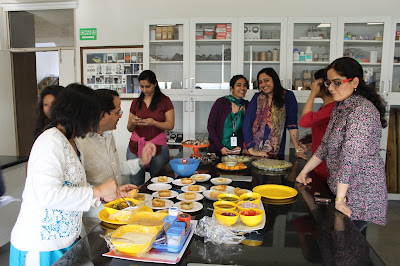It so happened that as the concluding event of the STEM week, a cookery competition was planned. I was asked if I could pitch in as one of the two contestants representing the English team for the cookery competition in school, The request took me by surprise because I have never participated in a cooking competition, ever, and this was rather surprising. I tried to wriggle out with good grace, only to be roped in again by Srija, a colleague of mine. Even as I thought about another excuse to save my skin, the idea of making Italian pasta came into my mind. Thinking about the pasta I said to her, 'OK, let's make Pasta.'She agreed and asked me to send her a list of ingredients which I sent. I continued to be a little apprehensive about the final product, but then my fears turned out to be wrong in the end. Srija and Avreen shopped all evening before the even and got some of the best Pasta available, and the cheese too!
My fears about the pasta were unfounded as, after the others tasted it, they said that it was good. The ingredients included broccoli, yellow and red capsicum,sweet corn, and of course the pasta sauce was made in house. We added layers of cheese and a bit of soy sauce too. The idea of cooking as a team was a fun idea, it helped create a break in the routine and was a wonderful stress-buster for the day!
'Is it done yet?' The toothpick is an ideal tool to check whether the cake is done or not. Taking the cake out too early will create problems.
A selfie moment: of course how could we forget the selfie in the midst of all that cooking! We are all conscious of ourselves and sure we can not afford to miss even a single moment of our lives. So selfie it was!
Ah, the perfect taste! The Katories were exceptional, as affirmed by our food critic and taster!
All smiles on a job well done! Srija had sourced all the ingredients for the Italian Pasta!
So what if the pan was empty, scraping the pan would help in any case. The pan is proof of the consumption of the food!
What happens when the Science team clubs with the French language team and the IT team is a virtual dish that needs to be tasted!
Stringing each bit carefully, a piece of olive, a square of cheese, and a nugget of Pineapple required a precision that could not afford any distraction!
The happiness is written large on the faces of the tasters! The joy of eating good and nutritious food is best understood by the stalwarts of the kitchen.
People who make good food appreciate the efforts of contestants who make exotic dishes once in a blue moon!
Would I say more? The piping hot samosas accompanied with the choley were simply irresistible. I stole one samosa and was forced to share parts of it!
It works out fine if the tasters are all smiles! The smiles are an indication of the success of the event. Good food will always bring smiles to faces, and I am sure you will agree!
Great food is the result of team work, coordination, and careful planning!
I couldn't help stealing one of the hot samosas, and in the process had to blow out the steam! Got caught though!
Carefully measured proportions!
Piping and steaming hot samosas, straight out of the pan!
This was a unique starter or snack! The combinations of an olive, a chunk of cheese and a slice of Pineapple was simply amazing!
A healthy spread, a veritable feast post production.
Can I have some more?
Bonding over a helping of foie gras!
So, we really did it, didn't we?
The cake was simply amazing. Had to take a second helping!
The food and the spirit with which it was made says it all! The cooks are amazing people who are not only excellent educationists but also exceptional human beings with the right dose of humour. The ability to come up with excellent ideas for excellent dishes is a tribute to their creativity and experiential abilities!



































